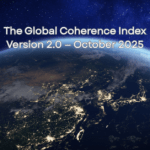Introducing Quantum International Relations: A New Framework for Global Politics
International Relations (IR) theory has long been shaped by classical schools of thought such as Realism, Liberalism, and Constructivism, each offering different lenses through which to analyze power, cooperation, and conflict. However, emerging scientific perspectives are pushing IR into new conceptual territory—Quantum International Relations (QIR).
Quantum IR is an interdisciplinary approach that integrates insights from quantum mechanics, complex systems theory, and dynamic global structures to better understand the fluid, uncertain, and interconnected nature of world politics. While still an emerging field, scholars such as Alexander Wendt and David Orrell argue that traditional IR theories struggle to fully capture the evolving nature of international interactions.
Core Concepts of Quantum IR
Unlike classical IR theories, which often assume fixed entities and rational decision-making, Quantum IR embraces principles inspired by nonlinear dynamics and relational systems:
- Entanglement & Relationality – Instead of viewing states as independent actors, QIR suggests nations, institutions, and leaders are deeply interconnected, influencing each other beyond immediate cause-effect relationships.
2. Superposition of Identities & Policies – Rather than binary choices (e.g., war or peace, ally or enemy), Quantum IR recognizes that states exist in fluid, overlapping states of identity and policy, shifting dynamically based on context.
3. Probabilistic Decision-Making – While classical IR assumes rational actors maximizing utility, Quantum IR suggests that political decisions emerge from patterns of global influence, where multiple outcomes coexist until action is taken.
4. Nonlinearity & Emergence – Power and geopolitical interactions do not follow linear cause-and-effect models but arise from self-organizing systems, where small events can cascade into major transformations.
Key Actors & Theorists
- Alexander Wendt – A pioneer of Quantum IR, Wendt challenges deterministic views of world politics, arguing that consciousness itself may play a role in shaping global events (Wendt, 2015).
- David Orrell – A researcher applying complex systems theory to economics and geopolitics, examining how patterns of uncertainty shape political reality (Orrell, 2018).
- Karen Barad – A scholar in quantum social theory, exploring how entanglement and agency apply to governance and international relations (Barad, 2007).
In contrast to classical IR theories that focus on power, institutions, or identities, Quantum IR suggests that uncertainty, probability, and relational entanglement define global affairs.
Why Quantum IR Matters Today
As global systems become increasingly interconnected, traditional theories struggle to explain shifting alliances, economic unpredictability, and emerging diplomatic technologies. Quantum IR offers a more adaptive, dynamic, and complexity-aware approach that could redefine our understanding of cooperation, influence, and stability.
(References listed below)
Key Publications:
- Quantum International Relations: A Human Science for World Politics
- This work proposes a novel framework for understanding global politics by drawing inspiration from quantum mechanics, challenging traditional deterministic and materialistic perspectives.
- Quantum Social Theory for Critical International Relations Theorists
- This book examines the intersection of advanced physics concepts and critical approaches to international relations, highlighting the shared goal of uncovering complexity and uncertainty in social phenomena.
Reimagining Soft Power through Advanced Scientific Lenses
Traditional notions of soft power are being reevaluated through the lens of contemporary scientific theories, offering new insights into the dynamics of influence and diplomacy.
Notable Study:
- Unlocking the Whole of Soft Power: A Quantum International Relations Approach
- This study introduces a radical departure from conventional explanations of soft power by applying principles from advanced physics, suggesting a more nuanced understanding of international influence. Taylor & Francis Online
Critiques and Debates
The application of advanced scientific theories to social sciences has sparked debates regarding their appropriateness and efficacy.
Critical Perspectives:
- Some scholars argue that importing concepts from physics into social sciences may be metaphorical rather than literal, cautioning against overextending scientific analogies.
Conclusion
The integration of contemporary scientific principles into the study of international relations represents a burgeoning field that seeks to capture the complexity and uncertainty inherent in global interactions. While offering fresh perspectives, it also invites critical examination to assess the validity and applicability of these interdisciplinary approaches.
Note: Given the emerging nature of this field, it is advisable to approach these interdisciplinary applications with both openness to innovation and a critical perspective to evaluate their practical implications.
References:
- Orrell, D. (2018). Quantum Economics: The New Science of Money. Icon Books.Wendt, A. (2015).
- Quantum Mind and Social Science: Unifying Physical and Social Ontology. Cambridge University Press.
- Barad, K. (2007). Meeting the Universe Halfway: Quantum Physics and the Entanglement of Matter and Meaning.Duke University Press.
- Gartzke, E., & Weisiger, A. (2013). Permanent Friends? The Production, Persistence, and Prevention of International Rivalry.International Studies Quarterly, 57(4), 739–753.
- Turok, N. (2012). The Universe Within: From Quantum to Cosmos. House of Anansi.Wilczek, F. (2021). Fundamentals: Ten Keys to Reality. Penguin Books.
- Alexander Wendt – Wikipedia. (n.d.). Retrieved from https://en.wikipedia.org/wiki/Alexander_Wendt
- Quantum International Relations: A Human Science for World Politics. (n.d.). Retrieved from https://academic.oup.com/book/43104
- Quantum Social Theory for Critical International Relations Theorists. (n.d.). Retrieved from https://link.springer.com/book/10.1007/978-3-030-60111-9
- Unlocking the Whole of Soft Power: A Quantum International Relations Approach. (n.d.). Retrieved from https://www.tandfonline.com/doi/full/10.1080/2158379X.2023.2270412









No responses yet